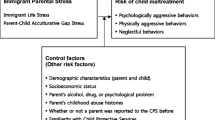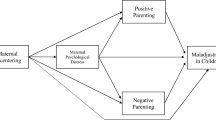Abstract
We investigate maternal attitudes toward corporal punishment and the attribution of blame to the child on the basis of data gathered from a population survey of a representative sample of mothers and mother figures. A total of 3,148 women living at least half of the time with a child participated in a telephone survey. The independent variables included in the multivariate model predicting maternal attitudes and attributions include the child’s, the mother’s and the family’s characteristics and social support. Results of the multiple regression analysis demonstrate the unique contribution of variables according to the mother’s characteristics (mother’s sensitivity to the consequences of violence, mother’s experience of childhood violence and parental stress related to child’s temperament). These results partially support the importance of prevention programs that would reduce stress and increase the level of parental empathy through the means of parental training.
Similar content being viewed by others
References
Abidin, R. R. (1995). Parenting stress index (3rd ed.). Odessa, FL: Psychological Assessment Resources.
Ateah, C. A., & Durrant, J. E. (2005). Maternal use of physical punishment in response to child misbehavior: Implications for child abuse prevention. Child Abuse & Neglect, 29, 169–185. doi:10.1016/j.chiabu.2004.10.010.
Baumrind, D., Larzelere, R. E., & Cowan, P. A. (2002). Ordinary physical punishment: Is it harmful? Comment on Gershoff (2002). Psychological Bulletin, 128, 580–589. doi:10.1037/0033-2909.128.4.580.
Belsky, J. (1993). Etiology of child maltreatment: A developmental-ecological analysis. Psychological Bulletin, 114, 413–434. doi:10.1037/0033-2909.114.3.413.
Bensley, L., Ruggles, D., Wynkoop Simmons, K., Harris, C., Williams, K., Putvin, T., & Allen, M. (2004). General population norms about child abuse and neglect and associations with childhood experiences. Child Abuse & Neglect, 28, 1321–1337. doi:10.1016/j.chiabu.2004.07.004.
Bower, M. E., & Knutson, J. F. (1996). Attitudes toward physical discipline as a function of disciplinary history and self-labeling as physically abused. Child Abuse & Neglect, 20(8), 689–699.
Bower-Russa, M. E. (2005). Attitudes mediate the association between childhood disciplinary history and disciplinary responses. Child Maltreatment, 10, 272–282. doi:10.1177/1077559505277531.
Bower-Russa, M. E., Knutson, J. F., & Winebarger, A. (2001). Disciplinary history, adult disciplinary attitudes, and risk for abusive parenting. Journal of Community Psychology, 29, 219–240. doi:10.1002/jcop.1015.
Buntain-Ricklefs, J. J., Kemper, K. J., Bell, M., & Babonis, T. (1994). Punishment: What predicts adult approval? Child Abuse & Neglect, 18, 945–955. doi:10.1016/S0145-2134(05)80005-5.
Caron, J. (1996). L’échelle de provisions sociales: Une validation québécoise. Sante Mentale au Quebec, 11, 181–199.
Clément, M.-È., & Bouchard, C. (2003). Liens intergénérationnels des conduites parentales à caractère violent: recension et résultats empiriques. Revue de Psychoéducation, 32, 49–77.
Clément, M.-È., & Bouchard, C. (2005). Predicting the use of single versus multiple types of violence towards children in a representative sample. Child Abuse & Neglect, 29(10), 1121–1139. doi:10.1016/j.chiabu.2005.04.006.
Clément, M.-È., Bouchard, C., Jetté, M., & Laferrière, S. (2000). La violence familiale dans la vie des enfants du Québec, 1999. Québec, QC: Institut de la statistique du Québec. Available online at http://www.stat.gouv.qc.ca/publications/conditions/violence.htm. Retrieved 2 May 2008.
Clément, M.-È., & Chamberland, C. (2007). Physical violence and psychological aggression towards children: Five-year trends in practices and attitudes from two population surveys. Child Abuse & Neglect, 31, 1001–1011. doi:10.1016/j.chiabu.2007.04.005.
Clément, M.-È., Chamberland, C., Dubeau, D., Côté, L., & Beauvais, B. (2005). La violence familiale dans la vie des enfants du Québec, 2004. Québec, QC: Institut de la statistique du Québec. Available online at http://www.stat.gouv.qc.ca/publications/conditions/violence_fam2004.htm. Retrieved 2 May 2008.
Clément, M.-È., Dufour, S., Chamberland, C., & Dubeau, D. (in press). Description et analyse des attitudes et attributions paternelles favorables à la punition corporelle. Canadian Journal of Behavioral Sciences.
Crouch, J. L., & Behl, L. E. (2001). Relationships among parental beliefs in corporal punishment, reported stress, and physical child abuse potential. Child Abuse & Neglect, 25, 413–419. doi:10.1016/S0145-2134(00)00256-8.
Cutrona, C. E. (1984). Social support and stress in the transition to parenthood. Journal of Abnormal Psychology, 93, 378–390. doi:10.1037/0021-843X.93.4.378.
Daro, D., & Gelles, R. J. (1992). Public attitudes and behaviors with respect to child abuse prevention. Journal of Interpersonal Violence, 7, 517–531.
Deater-Deckard, K., Lansford, J. E., Dodge, K. A., Pettit, G. S., & Bates, J. E. (2003). The development of attitudes about physical punishment: An 8-year longitudinal study. Journal of Family Psychology, 17, 351–360. doi:10.1037/0893-3200.17.3.351.
Duchesne, L. (2005). Données sociales du Québec. Montréal: Institut de la Statistique du Québec.
Durrant, J. E., Rose-Krasnor, L., & Broberg, A. G. (2003). Physical punishment and maternal beliefs in Sweden and Canada. Journal of Comparative Family Studies, 34(4), 585–604.
Flynn, C. P. (1998). To spank or not to spank: The effect of situation and age of child on support for corporal punishment. Journal of Family Violence, 13, 21–37. doi:10.1023/A:1022808716048.
Fortin, A., Chamberland, C., & Lachance, L. (2000). La justification de la violence envers l’enfant: un facteur de risque de violence. La Revue Internationale de l’Éducation Familiale, 4, 5–34.
Fortin, A., & Lachance, L. (1996). Mesure de la justification de la violence envers l’enfant: Étude de validation auprès d’une population québécoise. Cahiers Internationaux de Psychologie Sociale, 31, 91–103.
Gagné, M.-H., & Bouchard, C. (2001). Les représentations sociales de la violence psychologique faite aux enfants en milieu familial. Cahiers Internationaux de Psychologie Sociale, 49, 61–77.
Gagné, M.-H., Tourigny, M., Joly, J., & Pouliot-Lapointe, J. (2007). Predictors of adult attitudes toward corporal punishment of children. Journal of Interpersonal Violence, 22, 1285–1304. doi:10.1177/0886260507304550.
Gershoff, E. T. (2002). Corporal punishment by parents and associated child behaviors and experiences: A meta-analytic and theoretical review. Psychological Bulletin, 128, 539–579. doi:10.1037/0033-2909.128.4.539.
Gershoff, E. T., Miller, P. C., & Holden, G. W. (1999). Parenting influences from the pulpit: Religious affiliation as a determinant of parental corporal punishment. Journal of Family Psychology, 13, 307–320. doi:10.1037/0893-3200.13.3.307.
Graziano, A. M., Lindquist, C. M., Kunce, L. J., & Munjal, K. (1992). Physical punishment in childhood and current attitudes: An exploratory comparison of college students in the United States and India. Journal of Interpersonal Violence, 7, 147–155.
Grogan-Kaylor, A., & Otis, M. D. (2007). The predictors of parental use of Corporal punishment. Family Relations, 56, 80–91. doi:10.1111/j.1741-3729.2007.00441.x.
Holden, G. W., Miller, P. C., & Harris, S. D. (1999). The instrumental side of corporal punishment: Parents’ reported practices and outcome expectancies. Journal of Marriage and the Family, 61, 908–919. doi:10.2307/354012.
Jackson, S., Thompson, R. A., Christiansen, E. H., Colman, R. A., Wyatt, J., Buckendahl, C. W., Wilcox, B. L., & Peterson, R. (1999). Predicting abuse-prone parental attitudes and discipline practices in a nationally representative sample. Child Abuse & Neglect, 23, 15–29. doi:10.1016/S0145-2134(98)00108-2.
Lacharité, C., Éthier, L. S., & Couture, G. (1999). Sensibilité et spécificité de l’Indice de stress parental face à des situations de mauvais traitements. Revue Canadienne des Sciences du Comportements, 31, 217–220. doi:10.1037/h0087090.
Lacharité, C., Éthier, L. S., & Piché, C. (1992). Le stress parental chez les mères d’enfants d’âge préscolaire: Validation et normes québécoises pour l’Inventaire de Stress Parental. Sante Mentale au Quebec, 17, 183–204.
Larzelere, R. E. (2000). Child outcomes of nonabusive and customary physical punishment by parents: An updated literature review. Clinical Child and Family Psychology Review, 3, 199–221. doi:10.1023/A:1026473020315.
Larzelere, R. E., & Kuhn, B. R. (2005). Comparing child outcomes of physical punishment and alternative disciplinary tactics: A meta-analysis. Clinical Child and Family Psychology, 8, 1–37. doi:10.1007/s10567-005-2340-z.
Leung, D. W., & Smith-Slep, A. M. (2006). Predicting inept discipline: The role of parental depressive symptoms, anger, and attributions. Journal of Consulting and Clinical Psychology, 74, 524–534. doi:10.1037/0022-006X.74.3.524.
Lopez, N. L., Bonenberger, J. L., & Schneider, H. G. (2001). Parental disciplinary history, current levels of empathy, and moral reasoning in young adults. North American Journal of Psychology, 3(2), 193–204.
Lundahl, B., Nimer, J., & Parsons, B. (2006). Preventing child abuse: A meta-analysis of parent training programs. Research on Social Work Practice, 16, 251–262. doi:10.1177/1049731505284391.
Markowitz, F. E. (2001). Attitudes and family violence: Linking intergenerational and cultural theories. Journal of Family Violence, 16, 205–218. doi:10.1023/A:1011115104282.
McCurdy, K. (2005). The influence of support and stress on maternal attitudes. Child Abuse & Neglect, 29, 251–268. doi:10.1016/j.chiabu.2004.12.007.
McKee, L., Roland, E., Coffelt, N., Olson, A., Forehand, R., Massari, C., et al. (2007). Harsh discipline and child problem behaviors: The roles of positive parenting and gender. Journal of Family Violence, 22, 187–196. doi:10.1007/s10896-007-9070-6.
Milner, J. S. (2003). Social information processing in high-risk and physically abusive parents. Child Abuse & Neglect, 27, 7–20. doi:10.1016/S0145-2134(02)00506-9.
Muller, R. T., Hunter, J. E., & Stollak, G. (1995). The intergenerational transmission of corporal punishment: A comparison of social learning and temperament models. Child Abuse & Neglect, 19, 1323–1335. doi:10.1016/0145-2134(95)00103-F.
Mulvaney, M., & Mebert, C. (2007). Parental corporal punishment predicts behavior problems in early childhood. Journal of Family Psychology, 21, 389–397. doi:10.1037/0893-3200.21.3.389.
Paz Montes, M., De Paul, J., & Milner, J. S. (2001). Evaluations, attributions, affect, and disciplinary choices in mothers at high and low risk for child physical abuse. Child Abuse & Neglect, 25, 1015–1036. doi:10.1016/S0145-2134(01)00254-X.
Perez-Albeniz, A., & De Paul, J. (2003). Dispositional empathy in high- and low-risk parents for child physical abuse. Child Abuse & Neglect, 27, 769–780. doi:10.1016/S0145-2134(03)00111-X.
Pinderhughes, E. E., Dodge, K. A., Bates, J. E., Pettit, G. S., & McFadyen-Ketchum, S. A. (1999). The relation between mothers’ hostile attribution tendencies and children’s externalizing behavior problems: The mediating role of mothers’ harsh discipline practices. Child Development, 70, 896–909. doi:10.1111/1467-8624.00065.
Ringwalt, C. L., Browne, D. C., Rosenbloom, L. B., Evans, G. A., & Kotch, J. B. (1989). Predicting adult approval of corporal punishment from childhood parenting experiences. Journal of Family Violence, 4, 339–351. doi:10.1007/BF00978575.
Robinson, D. H., Funk, D. C., Beth, A., & Bush, A. M. (2005). Changing beliefs about corporal punishment: Increasing knowledge about ineffectiveness to build more consistent moral and informational beliefs. Journal of Behavioral Education, 14, 117–139. doi:10.1007/s10864-005-2706-9.
Rodriguez, C. (2008). Ecological predictors of disciplinary style and child abuse potential in a Hispanic and Anglo-American sample. Journal of Child and Family Studies, 17(3), 336–352. doi:10.1007/s10826-007-9145-2.
Rodriguez, C. M., & Price, B. L. (2004). Attributions and discipline history as predictors of child abuse potential and future discipline practices. Child Abuse & Neglect, 28, 845–861. doi:10.1016/j.chiabu.2004.02.003.
Rodriguez, C. M., & Sutherland, D. (1999). Predictors of parents’ physical disciplinary practices. Child Abuse & Neglect, 23, 651–657. doi:10.1016/S0145-2134(99)00043-5.
Schellenbach, C. J., Monroe, L. D., & Merluzzi, T. V. (1991). The impact of stress on cognitive components of child abuse potential. Journal of Family Violence, 6, 61–80. doi:10.1007/BF00978526.
Straus, M. A. (2001). Beating the devil out of them. Corporal punishment in American families (2nd ed.). New-York: Lexington Books.
Straus, M. A., & Stewart, J. H. (1999). Corporal punishment by American parents: National data on prevalence, chronicity, severity and duration, in relation to child and family characteristics. Clinical Child and Family Psychology, 2, 55–70. doi:10.1023/A:1021891529770.
Tolan, P., Gorman-Smith, D., & Henrynd, D. (2006). Family violence. Annual Review of Psychology, 57, 557–583. doi:10.1146/annurev.psych.57.102904.190110.
Trocmé, N., & Durrant, J. E. (2003). Physical punishment and the response of the Canadian child welfare system: Implications for legislative reform. Journal of Social Welfare and Family Law, 25, 39–56. doi:10.1080/0964906032000086241.
Trocmé, N., Durrant, J., Marwah, I., & Ensom, R. (2004). Physical abuse of children in the context of punishment. CECW Information Sheet #8E. Toronto, ON, Canada: Faculty of Social Work, University of Toronto.
Trocmé, N., Fallon, B., MacLaurin, B., Daciuk, J., Felstiner, C., Black, T., et al. (2005). Canadian incidence study of reported child abuse and neglect – 2003: Major findings. Ottawa: Minister of Public Works and Government Services Canada.
Wiehe, V. R. (1997). Approaching child abuse treatment from the perspective of empathy. Child Abuse & Neglect, 21, 1191–1204. doi:10.1016/S0145-2134(97)00094-X.
Author information
Authors and Affiliations
Corresponding author
Rights and permissions
About this article
Cite this article
Clément, MÈ., Chamberland, C. The Role of Parental Stress, Mother’s Childhood Abuse and Perceived Consequences of Violence in Predicting Attitudes and Attribution in Favor of Corporal Punishment. J Child Fam Stud 18, 163–171 (2009). https://doi.org/10.1007/s10826-008-9216-z
Received:
Accepted:
Published:
Issue Date:
DOI: https://doi.org/10.1007/s10826-008-9216-z




